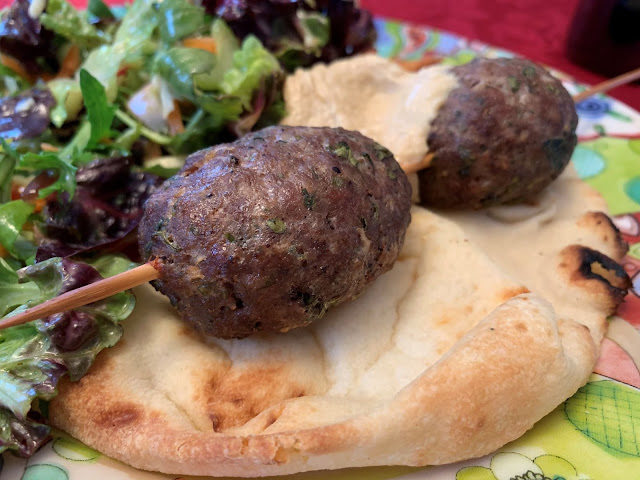When I first started my journey into Indian foods, it was a combination of being taken to an Indian Buffet or two, and then venturing into more as my cravings for those flavors expanded. That, along with the first cookbook I received, "The Complete Asian Cookbook" by Charmaine Solomon, with a section on Indian food, later followed by "The Bombay Palace Cookbook" by Stendahl.
In each Indian Buffet I frequented, there were little lamb meatballs, obviously done on a grill or maybe in a tandoor oven, and definitely with a char-grilled flavor. Prominent enough to notice in these meatballs was the flavor of mint, other spices just making the whole so very delightfully flavored. I looked for these, when I found them, as they quickly became a favorite.
But, what are they called?
That is something I never found out.
 |
| Lamb Kofta or Lamb Seekh Kebabs |
Over the many, many years since those early days, I have learned a lot more about Indian cooking, recipes, flavors, flavors divided by areas of India, spices - oh! the spices! - and so very much more. But, I never did find a specific recipe for those little grilled lamb meatballs. On the buffets, they were always in a bin of their own. No sauce, maybe a sprinkling of fresh cilantro.
Much later, reading about Middle Eastern foods and such, while the flavors in general do not call me the way Indian foods do, there are a lot of great foods I have tried to date, and I also read about how much of the food of Persia and other Middle East countries filtered down into India, and in fact is how Naan bread came to be in northern Indian cuisine.
And there I discovered Kofta. And then Seekh Kebabs.
Or Kefta, or Kafta, but however the spelling comes out, these are the very closest to the flavors I was looking for. I did a little tweaking, mainly adding in a little more fresh mint, but mostly in keeping with the flavors I recalled. Grilling (or broiling in a pinch) gives them that marvelous added layer of flavor. Obviously in a country that does not, in general, eat beef, if they even eat meat at all, lamb would be the red meat of choice. The closest to these little meatballs I have found in Indian cookbooks is called Seekh Kebab, usually the "seekh" referring to ground or minced meat (but not always!) and can be used for lamb, chicken or whatever meat is being used in the recipe. I have made Seekh Kebabs with chicken meat, and they are good, though I made them in a frypan. These type of kebab are usually formed into long sausage shapes around skewers, more often a flat skewer that helps keep the meat on while rotating on the grill.
Ultimately, no matter what you call them, these are the closest approximation to those wonderful little grilled meatballs on the Indian Buffets.
Lamb Kofta or Lamb Seekh Kebabs
Makes about 6 to 8 servings
 |
| Lamb Kofta or Lamb Seekh Kebabs |
1 medium potato, baked, cooled, peeled, riced
3 large cloves garlic, minced finely
½ cup fresh parsley, minced finely
½ cup fresh mint, minced finely
¼ cup fresh cilantro, finely minced
1½ teaspoons salt
1 teaspoon ground sumac, optional
½ teaspoon ground cinnamon
½ teaspoon ground allspice
½ teaspoon ground cumin
½ teaspoon ground cardamom
½ teaspoon ground black pepper
- Pinch ground cloves
To be more authentic, finely mince the meats, or briefly pulse them in the food processor. It should not be paste, but much finer than ground meat.
Combine all the ingredients and mix well with clean hands to distribute all the spices evenly. Form the mixture into elongated meatball shapes on pre-soaked bamboo skewers or on metal skewers. Another method is to form the meat into a single-thickness hot-dog shape, evenly along the length of the skewer. To bake the kofta, preheat oven to 425 degrees. Set the skewers on a broiler rack or other rack over a rimmed baking sheet and bake the kofta for 20 to 25 minutes. Thinner meat formed along the length of the skewer will be done in a much shorter time. If grilling, grill as for burgers, turning as needed for even browning. Serve with tzatziki or hummus and flatbreads with a side salad for an amazing meal.

No comments:
Post a Comment